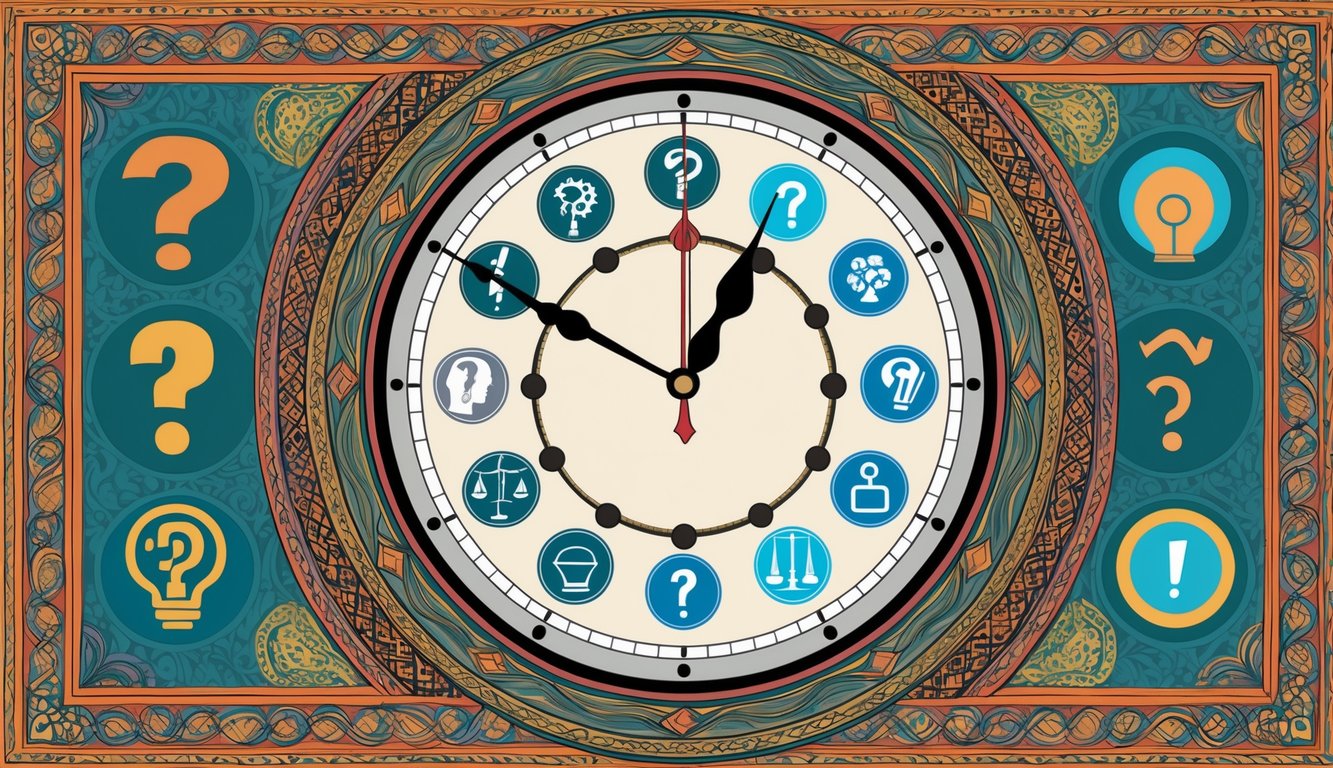Don’t Miss Out On This Unique Astrological Opportunity
Are you tired of spinning your wheels and getting nowhere? Simply put, you’re out of sync: you’re out of alignment with your astral configuration.
But: there’s a kind of map that can help you reclaim your alignment. Think of it as your own personal blueprint to success and happiness: a blueprint that will help you live your most amazing life.
Get started here.
Have you ever wondered how your life’s ups and downs fit into a greater plan? Ecclesiastes 3 offers insights on this. This chapter of the Bible reminds you that every event and moment has its own timing. It suggests a rhythm to life that aligns with a larger order, hinting at a balance between joy and sorrow, growth and decay.
As you explore these verses, you’ll see that they present a view of time and experiences in a way that embraces both the good and bad in life.
It’s almost as if life is a dance where every step matters.
The text prompts you to reflect on how you spend your days and what truly brings you satisfaction and peace.
These timeless words can guide your understanding of work and rest, showing how to find meaning in daily tasks.
The wisdom within these lines connects human experiences to a divine order, offering comfort and perspective for life’s journey.
Key Takeaways
- Every event in life has its own timing.
- Life balances joy and sorrow, growth and decay.
- Meaning can be found in daily tasks and experiences.
Understanding Time and Season
Ecclesiastes 3 explores the theme of time, focusing on how every event in life has its season.
The chapter emphasizes the balance between different phases, like birth and death, or planting and harvesting, and how these moments are part of a larger, divine tapestry.
The Concept of Time in Ecclesiastes
In Ecclesiastes 3, time is viewed as a series of predetermined events, each with its own moment. A time for everything reflects the idea that all things in life have an appropriate moment.
This perspective can lead you to consider how each event, from joyous occasions to challenging times, is essential in the grand scheme of life.
The passage conveys that nothing happens by chance, and each event is a key part of the overall timeline.
Eternity and Transience of Life
Ecclesiastes also speaks of the tension between eternity and the fleeting nature of life.
You get a sense of life’s quick passage and the eternal backdrop against which it unfolds.
While life can feel short and temporary, these moments are part of something greater and timeless.
This passage suggests that understanding this can bring peace, helping you appreciate life’s rhythms and winding paths without fear or frustration.
Seasons for Every Activity
The passage famously suggests there is a season for every activity under heaven.
Life is seen as a mix of contrasting periods: birth and death, laughing and weeping, gathering and scattering.
These activities follow a natural cycle, and each one has its rightful place.
You learn that embracing these seasons can help you find balance and acceptance, trusting that everything is made beautiful in its time.
This view can prompt reflection on personal experiences and seasons in your own life, recognizing their purpose and value.
This perspective encourages a deeper appreciation for life’s ebb and flow, reminding us that each moment has significance.
Recognizing these seasons can also provide insight into spiritual themes, such as the meaning of Easter, which symbolizes renewal, hope, and the promise of new beginnings.
By embracing these cycles, we can cultivate gratitude and a greater sense of peace in our journey.
Exploring the Ebb and Flow of Human Experiences
In Ecclesiastes 3, you see a poetic look at life’s cycles.
Each moment has its own time from joy to sorrow, mirroring your experiences across the stages of life.
You find yourself transitioning naturally through these phases, seeking harmony between them.
The Spectrum of Human Emotions
You may find emotions shifting over time.
Ecclesiastes speaks to this by noting that there is a time to weep and a time to laugh.
These moments are part of what makes you human, allowing space for both joy and grief.
Understanding that it’s normal to feel a wide range of emotions can be comforting as you navigate life’s ups and downs.
Consider times when you love deeply and moments when you might hate something.
Emotions aren’t static and change as circumstances do.
You might mourn losses but also dance in celebrations.
Embracing these contrasts helps you appreciate all human experiences, ensuring no emotion is permanent but part of a larger tapestry you create daily.
From Birth to Death: The Inevitable Cycle
Life begins with birth and ends with death, forming a natural cycle you’re part of.
Ecclesiastes reminds you that there’s a time to be born and a time to die.
Every life phase from growing up, experiencing new things, and eventually aging is part of this larger rhythm.
You might witness the births of loved ones and also stand at funerals.
Birth represents new beginnings while death symbolizes closure.
Acknowledging this cycle helps you see the continuity of life beyond any individual experience.
By recognizing life’s impermanence, you cherish what truly matters and prioritize your time wisely, using it to bond with others and grow in love and wisdom.
Finding Balance: Embrace and Refrain
An important aspect of life is finding balance, knowing when to embrace and when to refrain.
Ecclesiastes describes this need for discernment.
There is a time to keep and a time to throw away, encouraging you to hold onto what enhances your life and let go of what doesn’t serve you anymore.
This can mean deciding when to speak or when to be silent.
Such decisions affect your relationships and personal growth.
Understanding when to act and when to pause allows you to live harmoniously, make meaningful connections, and find peace within yourself.
Embrace moments fully but know that stepping back is also essential.
The Divine and Moral Dimensions

Ecclesiastes 3 explores how God sets the stage for human life with divine justice while guiding moral conduct.
These aspects shape how you experience joy and purpose.
The Role of God and Divine Justice
God is depicted as the ultimate judge, orchestrating everything according to a divine timetable.
In Ecclesiastes 3, you learn that there is a time for every purpose under heaven—whether it be birth, death, war, or peace.
This divine order offers you a sense of security, knowing that God’s justice prevails over human chaos.
You are encouraged to respect this divine order and embrace the gift of joy in everyday life.
By recognizing God’s sovereignty, you understand that life’s uncertainties are under divine control, influencing how you approach life’s challenges.
Moral Conduct and Its Impact
Your moral conduct plays a crucial role in aligning with the divine plan.
Ecclesiastes reminds you that acting righteously is not just beneficial but aligns with God’s desires.
Moral behavior allows you to enjoy life’s true gifts, like happiness and contentment, which are seen as the direct blessings of God.
Fearing God is viewed as a guiding principle.
It encourages you to live justly and avoid wickedness, knowing that your choices impact both your life and spiritual well-being.
In acting morally, you find an advantage in fulfilling a life that is not only meaningful but also harmonious with God’s will.
Reflections on Work and Satisfaction

Ecclesiastes 3 explores the cycle of life’s activities, highlighting how work, enjoyment, and satisfaction are intertwined.
This section covers finding rewards in labor and feeling content with one’s efforts.
Labor and Its Rewards
Your work under the sun is essential.
The labor you put in is not just a means to an end but can be rewarding in its own right.
While toiling on the earth, finding joy in the fruits of your labor is important.
When you eat, drink, and enjoy what you have earned, it makes work worthwhile.
The balance between effort and reward can affect your satisfaction.
It’s vital to recognize that the rewards of your labor aren’t just material.
Personal growth and fulfillment make the process meaningful.
By investing effort, you contribute to your own well-being and that of others.
This mindset can help you find joy in day-to-day tasks and make labor more rewarding.
Contentment in One’s Toil
Feeling content with your toil is about embracing the everyday moments.
Recognizing the value in daily tasks can boost satisfaction.
While working under the sun, it’s easy to overlook how your efforts contribute to a greater purpose.
Embrace doing good in your work, and see how it enhances your experience. Contentment doesn’t mean lacking ambition; instead, it means appreciating what you have achieved.
When you focus on positive aspects, your work becomes more enjoyable and fulfilling.
By finding balance and satisfaction in what you do, your work life can become a source of true happiness.
Frequently Asked Questions

In Ecclesiastes 3, you explore the themes of time and purpose through its famous verses.
The passage discusses how different seasons in life impact your perception of joy, pain, and everything in between.
What insights do we get from the passage Ecclesiastes 3:1-8?
In Ecclesiastes 3:1-8, you discover that life consists of various seasons, each with its own purpose.
These verses list contrasting pairs, such as a time to be born and a time to die.
This highlights the ebb and flow of life.
How does Ecclesiastes 3:11 contribute to the overall message of the chapter?
Ecclesiastes 3:11 points out that everything is made beautiful in its time.
You see that there is a divine order, even if you can’t understand it fully.
This verse reminds you to trust the process and find peace in knowing there may be a bigger plan.
What is the significance of the different seasons mentioned in Ecclesiastes 3?
The different seasons in Ecclesiastes 3 symbolize how life changes and evolves.
You experience happiness, sadness, beginnings, and endings.
These seasons teach you acceptance and adaptation, showing that each phase has its own value and significance.
In what ways are the themes of time and purpose explored in Ecclesiastes 3:1-11?
Ecclesiastes 3:1-11 dives into the themes of time and purpose by showing you that every event in life happens for a reason.
While things may seem random or chaotic, this section reminds you that there is a timing for everything, helping you seek meaning in life’s events.
How can Ecclesiastes 3 be interpreted and applied in modern life?
In modern life, you can interpret Ecclesiastes 3 as a guide to living mindfully.
It encourages you to embrace change and trust in timing.
Whether facing challenges or celebrating success, these teachings remind you to find balance and meaning in each moment.
Why might Ecclesiastes 3 be considered relevant or meaningful for commemorative occasions?
When celebrating life events or remembering loved ones, Ecclesiastes 3 resonates by acknowledging life’s cyclical nature.
You find comfort and significance in its words during weddings, funerals, and other ceremonies.
It encourages reflection on the passage of time and life’s meaning.



